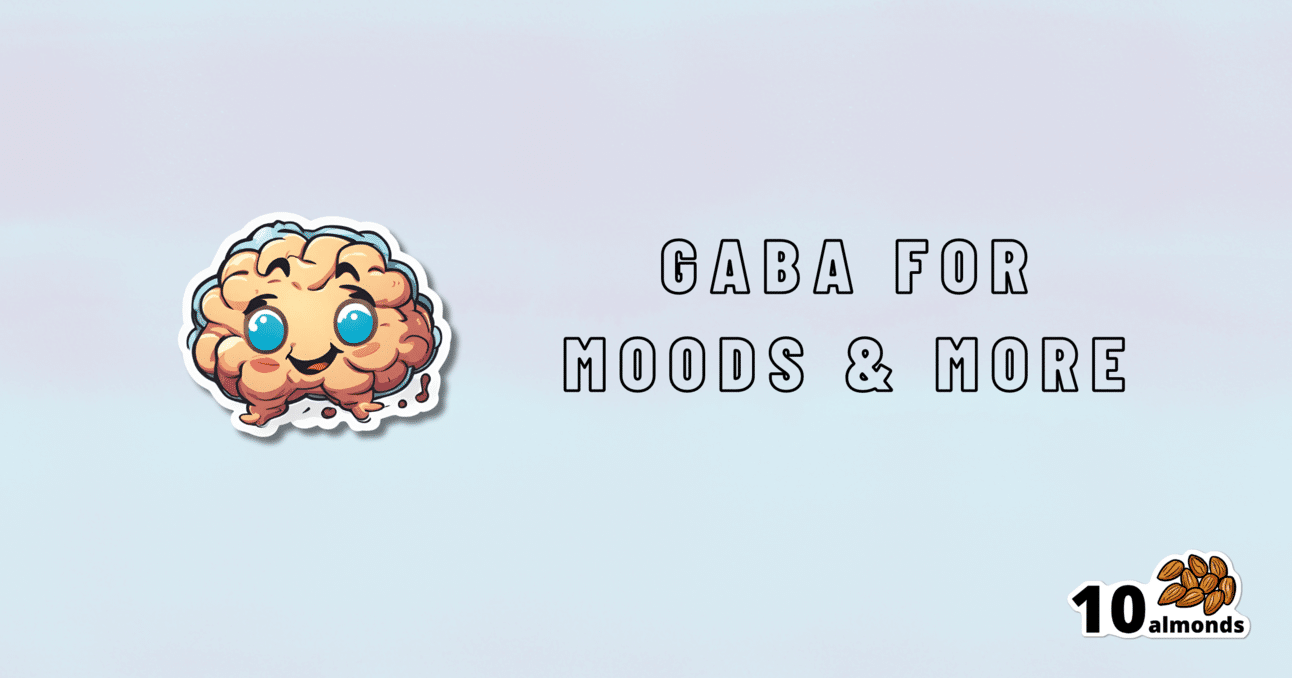GABA Against Stress/Anxiety
GABA: the lesser-known neurotransmitter with big benefits. From reducing stress to enhancing cognition, here’s what you need to know.

A Neurotransmitter Less Talked-About
GABA is taken by many people as a supplement, mostly as a mood modifier, though its health claims go beyond the recreational—and also, we’re of the opinion that mental health is also just health, and if it works, it works. We’ll explore some of the claims and science behind them today…
What is GABA?
GABA stands for gamma-aminobutyric acid, and it’s a neurotransmitter. It’s a lot less talked-about than for example dopamine or serotonin, but it’s very important nonetheless.
We make it ourselves inside our body, and we can also get it from our food, or supplement it, and some drugs will also have an effect on its presence and/or activity in our body.
What foods is it found in?
- Animals, obviously (just like in human brains*)
- Fermented foods (many kinds)
- Yeast
- Tea
- Tomatoes
- Mulberries
For more details, see:
γ-Aminobutyric acid found in fermented foods and beverages: current trends
*However, we do not recommend eating human brains, due to the risk of CJD and prion diseases in general.
What claims are made about it and are they true?
For brevity, we’ll give a little spoiler up-front: all the popular claims for it appear to be valid, though there’s definitely room for a lot more human trials (we skipped over a lot of rodent studies today!).
So we’ll just drop some of its main benefits, and human studies to back those.
Reduction of stress and anxiety
GABA decreases task-related stress and anxiety within 30 minutes of being taken, both in subjective measures (i.e., self-reports) and in objective clinical physiological measures:
Cognitive enhancement
It’s not a does-everything nootropic like some, but it does have clear benefits to episodic memory:
❝GABA intake might help to distribute limited attentional resources more efficiently, and can specifically improve the identification and ordering of visual events that occur in close temporal succession❞
One of the things that makes this one important is that it also deals with the often-asked question of “does GABA pass the blood-brain barrier”:
❝The present findings do give further credence to the idea that oral ingestion does allow GABA to reach the brain and exert direct effects on cognition, which in the present case were specific to temporal attention.❞
Read more:
Supplementation of gamma-aminobutyric acid (GABA) affects temporal, but not spatial visual attention
Potential for more
We take care to give good quality sources, so the following study comes with a big caveat that it has since been retracted. Why was it retracted, you wonder?
It’s about the sample; they cite “30 healthy adults”, but neglected tp mention that this figure was initially 46. What happened to the other 16 participants is unclear, but given that this was challenged and the challenge not answered, it was sufficient for the journal (Nature) to pull the study, in case of deliberate sample bias.
However! Running the numbers in their results section, a probability of 0.03 is very compelling unless the disappearance of 16 subjects was outright fraudulent (which we regrettably cannot know either way).
Here’s the study (so take it with a pinch of salt, considering the above), and taken at face value, it shows how GABA supplementation improves accurate reactions to fast-moving visual and auditory stimuli:
RETRACTED ARTICLE: γ-Aminobutyric acid (GABA) administration improves action selection processes: a randomised controlled trial
…so, hopefully this experiment will be repeated, without disappearing participants!
The sweet spot
You may be wondering how something that slows a person down (having a relaxing effect) can also speed a person up. This has to do with what it is and isn’t affecting; think of it like a “focus mode” on your computer or other device that greys-out everything else a bit so that you can focus on what you’re doing.
It’s in some ways (by different neurochemical pathways, though) a similar effect to the “relaxed alertness” created by l-theanine supplementation.
There’s also a sweet spot whereby GABA is toning some things down just the right amount, without adversely affecting performance in areas we don’t want slowed down. For the science of this, see:
Is it safe?
GABA is “Generally Recognized As Safe”. However:
- you should speak with your pharmacist if you are taking any medications for blood pressure or epilepsy, as GABA supplementation may cause them to work too well.
- you should absolutely not take GABA with alcohol or opioids as (dose-dependent for all the substances involved, and also depending on your metabolic base rate and other factors) its acute depression of the CNS can mean you relax and slow down too much, and you may find yourself not breathing often enough to sustain life.
Aside from that, it is considered safe up to at least 1g/kg/day*. Given that popular doses are 120–750mg, and most people weigh more than 750g, this is very safe for most people:
United States Pharmacopeia (USP) Safety Review of Gamma-Aminobutyric Acid (GABA)
Where can I get it?
We don’t sell it, but for your convenience, here’s an example product on Amazon 😎
Enjoy!
Share This Post
Learn To Grow
Sign up for weekly gardening tips, product reviews and discounts.




